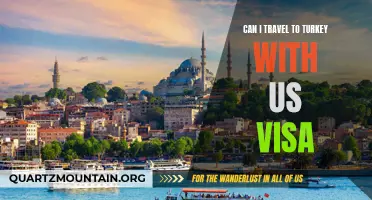
Traveling to different countries can be an exciting and enriching experience. However, before you embark on your global adventures, it's important to understand the basics of travel visas. These essential documents are often required for entry into foreign countries and can vary in terms of their purpose and requirements. Whether you're a seasoned traveler or someone planning their first international trip, knowing the ins and outs of travel visas is crucial. In this article, we'll explore the basics of travel visas and what you need to know to navigate the process successfully. So, buckle up and get ready to dive into the world of travel visas!
What You'll Learn

Introduction to Visas for Traveling
If you're planning to travel abroad, one essential document you need to familiarize yourself with is a visa. A visa is an official authorization that allows you to enter and stay in a foreign country for a specific period. It serves as proof that you have met the necessary requirements and obtained permission to travel or work in the destination country.
Different countries have different visa requirements, so it's crucial to research and understand the visa policies of your intended destination. Some countries allow visa-free entry for citizens of certain countries, while others require visas for all foreign travelers.
Visas are generally classified into two main categories: immigrant visas and non-immigrant visas. Immigrant visas are for those who wish to permanently relocate to a foreign country, often for work or family reasons. Non-immigrant visas, on the other hand, are for temporary stays, such as tourism, business, study, or medical treatment.
To apply for a visa, you typically need to gather certain documents, such as a valid passport, completed visa application form, passport-sized photos, proof of financial stability, and supporting documents specific to the purpose of your visit, such as an invitation letter, employment contract, or acceptance letter from an educational institution.
The visa application process usually involves submitting your application to the embassy or consulate of the destination country. They will review your application and may conduct an interview to determine your eligibility. Processing times can vary, so it's advisable to start the application process well in advance of your intended travel dates.
It's worth noting that visa requirements and processes can change over time, so it's essential to stay updated with the latest information from the embassy or consulate of your intended destination. Additionally, some countries offer visa-on-arrival or electronic visas, which allow you to obtain the visa upon arrival or apply online before your trip, respectively.
Visas play a crucial role in ensuring safe and legal travel. They help authorities manage and control the entry of foreigners, maintain national security, and protect the economic and social well-being of the host country. By understanding the visa requirements and following the necessary procedures, you can ensure a smooth and hassle-free travel experience.
In conclusion, a visa is a vital document that grants you permission to enter and stay in a foreign country. It's crucial to familiarize yourself with the visa policies and requirements of your intended destination and to complete the application process in a timely manner. By doing so, you can ensure that your travel plans proceed smoothly and legally, allowing you to fully enjoy your trip abroad.
Can Indians Travel to US on Tourist Visa?
You may want to see also

Types of Visas and Their Requirements
Whether you're planning a short vacation or a long-term move to another country, one of the most important things to consider is your visa. A visa is an official document that allows you to enter, stay, and leave a foreign country legally. Depending on your purpose of travel and the country you're visiting, there are different types of visas available. In this article, we'll discuss some of the most common types of visas and their requirements.
Tourist Visa:
A tourist visa allows you to visit a foreign country for leisure or recreational purposes. This visa is usually valid for a specific period, such as 30 days, 60 days, or 90 days, depending on the country. To obtain a tourist visa, you typically need to provide proof of your travel itinerary, accommodation arrangements, and sufficient funds to support yourself during your stay. You may also be required to show proof of return or onward travel.
Business Visa:
If you're traveling to another country for business purposes, you'll need a business visa. This type of visa allows you to attend meetings, conferences, negotiate contracts, or explore potential business opportunities. To obtain a business visa, you'll need to provide a letter of invitation from a company or organization in the destination country, along with other supporting documents such as proof of business registration, financial statements, and a resume.
Student Visa:
For those planning to study abroad, a student visa is required. This visa allows you to pursue an educational program in a foreign country, such as a university degree or language course. To apply for a student visa, you'll need to provide an acceptance letter from a recognized educational institution, proof of financial capability to cover tuition fees and living expenses, and sometimes, proof of health insurance.
Work Visa:
If you're planning to work in a foreign country, a work visa is necessary. This type of visa allows you to legally work and earn income in the host country. The requirements for a work visa vary depending on the country and the specific job offer. Generally, you'll need to provide a job offer letter from a company in the destination country, proof of your qualifications and work experience, and sometimes, evidence of a labor market test.
Spouse or Family Visa:
If you're married to a citizen or permanent resident of another country, you may be eligible for a spouse or family visa. This type of visa allows you to join your spouse or family member in their country of residence. The requirements for a spouse or family visa typically include proof of your relationship (such as marriage certificate or birth certificates), evidence of financial support, and sometimes, a criminal background check.
Transit Visa:
A transit visa is needed if you're making a stopover in a foreign country on the way to your final destination. This type of visa allows you to stay in the transit country for a short period of time, usually less than 48 hours. The requirements for a transit visa vary depending on the country and the duration of your stay. In most cases, you'll need to provide proof of onward travel and a valid visa for your final destination.
It's important to note that visa requirements can change frequently, so it's essential to check the official website of the embassy or consulate of the country you plan to visit for the most up-to-date information. Additionally, the application process for visas can be complex and time-consuming, so it's advisable to start the process well in advance of your intended travel dates.
In conclusion, understanding the different types of visas and their requirements is crucial when planning your travel to another country. Whether you're going for tourism, business, study, work, or to join your family, make sure to gather all the necessary documents and fulfill the requirements to ensure a smooth visa application process.
Exploring Canada on a Valid H1B Visa: Unveiling Travel Opportunities for Tourists
You may want to see also

How to Apply for a Visa for Traveling
Are you planning to travel to a foreign country? If so, you may need to apply for a visa. A visa is an official document issued by a government that allows individuals to enter, stay, or exit their country for a specific period of time and purpose. It is an essential requirement for international travel, and without it, you may be denied entry at your destination.
Applying for a visa can be a complex process, but with the right information and preparation, it can be a relatively straightforward task. Here is a step-by-step guide on how to apply for a visa for traveling:
- Determine the type of visa you need: The first step is to determine the type of visa you require based on the purpose and duration of your trip. Common types of visas include tourist visas, business visas, student visas, and work visas. Each type of visa has its own set of requirements and eligibility criteria, so make sure you choose the right one.
- Research the visa requirements: Once you have determined the type of visa you need, research the specific requirements for that visa. Visit the website of the embassy or consulate of the country you plan to visit and look for the visa section. There, you will find detailed information about the documents, forms, and fees required for the application.
- Complete the visa application form: Fill out the visa application form accurately and completely. Make sure to provide all the requested information, including your personal details, travel plans, and purpose of visit. Depending on the country, you may need to submit a physical form or apply online through an electronic system.
- Gather the required documents: Collect all the necessary documents required for your visa application. These may include a valid passport with at least six months of validity remaining, recent passport-sized photographs, proof of travel insurance, flight itineraries, hotel reservations, bank statements, and a letter of invitation if applicable. Be sure to check the specific requirements for your visa type and ensure that all documents are up to date.
- Pay the visa fees: Most visa applications require a fee, which can vary depending on the country and visa type. Make sure to check the correct amount and method of payment accepted by the embassy or consulate. Keep in mind that the fee is usually non-refundable, regardless of whether your visa is approved or not.
- Schedule an appointment: In some cases, you may need to schedule an appointment to submit your visa application and supporting documents. Check the embassy or consulate's website for information on how to book an appointment. It is advisable to schedule your appointment well in advance to avoid any last-minute delays or complications.
- Attend the visa interview (if required): Depending on the country and visa type, you may be required to attend a visa interview. This is an opportunity for the consular officer to ask you questions about your application and verify your intentions. Prepare for the interview by familiarizing yourself with the purpose of your trip, being honest and concise in your responses, and providing any additional documents or evidence that may support your application.
- Track your visa application: After submitting your visa application, keep track of its progress. Many embassies and consulates offer online tracking systems that allow you to check the status of your application using a reference number or passport details. Stay updated and be prepared to provide any additional information or documents that may be requested during the processing period.
- Collect your visa and prepare for your trip: Once your visa is approved, you will need to collect your passport with the visa stamp. Check the embassy or consulate's instructions on how and when to collect your visa. Make sure to review the visa details and check for any errors or discrepancies. Finally, start preparing for your trip by arranging accommodation, booking flights, and taking any necessary vaccinations.
Applying for a visa may seem daunting, but with careful planning and organization, you can successfully obtain one for your travels. Remember to start the process well in advance to allow for any potential delays or complications. Follow these steps, be thorough with your documentation, and ensure you meet all the requirements of your chosen destination. Safe travels!
Exploring International Borders: The Possibility of Traveling with an Immigrant Visa
You may want to see also

Important Things to Know About Travel Visas
If you're planning to travel internationally, it's essential to understand the role of a travel visa. A visa is an official document issued by a foreign country that allows you to enter and stay in their territory for a specific period. It grants you permission to travel for various purposes, including tourism, business, education, or employment. Here are some essential things you should know about travel visas before you embark on your journey.
Types of Visa:
There are several types of visas, depending on the purpose of your trip and the country you plan to visit. The most common types include tourist visas, business visas, student visas, and work visas. Each visa has specific requirements, conditions, and timeframes, so it's crucial to apply for the correct one based on your travel plans.
Visa-Free Travel:
Some countries have agreements that allow travelers to visit without a visa for a specific period. This privilege is often granted to citizens of certain countries who intend to stay for a limited period, usually for tourism purposes. However, even if your destination offers visa-free travel, it's essential to check the specific conditions and restrictions to ensure you comply with all the rules.
Application Process:
Applying for a visa requires careful attention to detail and adherence to the specific requirements set by the embassy or consulate of the country you plan to visit. The application process typically includes filling out a visa application form, providing supporting documents such as passport copies, photographs, travel itineraries, proof of accommodation, and financial statements. It's crucial to start this process well in advance to allow for any potential delays or complications.
Visa Validity and Stay Duration:
Visa validity refers to the duration during which your visa is officially recognized as valid for entry. It's important to note that the visa's validity period does not represent the duration you can stay in a foreign country. Instead, it specifies the time when you can use the visa to enter the country. The stay duration, on the other hand, indicates how long you are allowed to remain in the country once you've entered. The duration can vary from a few days to several months, depending on the visa type and the country's regulations.
Visa Fees and Processing Time:
Most visa applications require payment of a fee, which often varies based on the visa type, the country, and the processing time. It's crucial to budget for these fees and account for the processing time when planning your trip. Visa processing times can range from a few days to several weeks, so make sure you apply well in advance to avoid any last-minute complications.
Visa Denial and Appeals:
In some cases, visa applications may be denied. The reasons for visa denial can vary from incomplete documentation to concerns about your travel intentions or immigration history. If your visa application is denied, you may have the option to appeal the decision or reapply with additional supporting documents. It's essential to carefully review the rejection notice to understand the specific reasons and follow the appropriate procedures for appeals or reapplications.
Visa-Free Transit:
If you have a connecting flight in a foreign country and do not plan to leave the airport during the layover, you may be eligible for visa-free transit. This allows you to stay in the transit area without a visa for a limited period, usually ranging from a few hours to a couple of days. However, it's important to verify the specific requirements and conditions for visa-free transit, as they can vary between countries and airports.
In conclusion, understanding the fundamentals of travel visas is crucial for international travelers. By familiarizing yourself with the types of visas, application processes, fees, and restrictions, you'll be better prepared to navigate the complexities of obtaining a visa and ensure a smooth and enjoyable travel experience. Remember to start the visa application process well in advance and comply with all the requirements to increase your chances of approval.
Exploring the World with Just a Visa: Your Ultimate Travel Guide
You may want to see also
Frequently asked questions
A visa is an official document that allows individuals to enter, stay, or transit through a country for a specific period of time.
To obtain a visa, you usually need to submit an application to the embassy or consulate of the country you wish to visit. The requirements and process can vary depending on the country and the purpose of your travel.
The time it takes to get a visa can vary depending on the country and the type of visa you are applying for. It can range from a few days to several weeks or even months in some cases. It is best to apply well in advance of your planned travel dates.
When applying for a visa, you will typically need to provide information such as your passport details, purpose of travel, travel itinerary, proof of financial means, accommodation details, and sometimes additional documentation such as an invitation letter.
Whether or not you can travel without a visa depends on your citizenship and the country you want to visit. Some countries have visa-free agreements with certain countries, allowing citizens to enter without a visa for a limited period. However, for most international travel, a visa is required.







